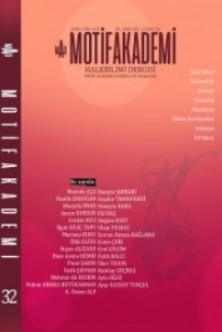EKOFEMİNİZM BAĞLAMINDA CHARLOTTE PERKINS GILMAN’IN KADINLAR ÜLKESİ ESERİNİN İNCELENMESİ
AN ECOFEMINIST ANALYSIS OF CHARLOTTE PERKINS GILMAN’S NOVEL CALLED HERLAND
Author(s): Ecem ÇEBİ, Elif BaşSubject(s): Gender Studies, Human Ecology, Theory of Literature, American Literature
Published by: Motif Halk Oyunları Eğitim ve Öğretim Vakfı
Keywords: Ecofeminism; Herland; woman; nature; ecology;
Summary/Abstract: Feminism, a movement advocating for gender equality, is an approach that stands up to male supremacy and divides into various waves by undergoing periodical changes from past to present. Attempting to eliminate established gender inequality that directly or indirectly pervades all sections of society is amongst the primary objectives of feminists who constitute the ideational structure of feminist waves. In fact, ecofeminism, as one approach to feminism, constructs a synthesis of feminism and corresponds to a social movement that asserts that masculine mentality has brought nature, as well as women, under its dominance. Ecofeminism, asserting that there exists a joint relationship between oppressive patriarchal relations and the oppression of nature, focuses on the problems of environment and woman in social, cultural, historical contexts. Many literary works also discuss this approach in various ways, though not directly. Indeed, Herland, written by Charlotte Perkins Gilman in 1915, can be considered as one of them. In this utopian work, the point of view of masculine mentality to nature and woman is written with an interrogative language. In this paper, Gilman’s work, Herland, is examined in the context of the ecofeminist perspective by taking modern human’s attempts to understand nature, women, and traditions from a different viewpoint also into consideration.
Journal: Motif Akademi Halkbilimi Dergisi
- Issue Year: 13/2020
- Issue No: 32
- Page Range: 1621-1640
- Page Count: 20
- Language: Turkish

